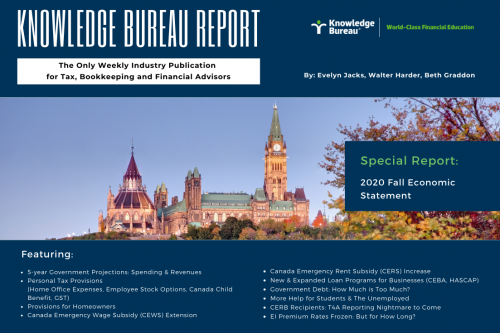Last updated: December 01 2020
Special Report: November 30 Fall Economic Statement

In its second economic update since the start of the pandemic, the federal government announced a continuation of pandemic support measures for individuals and business owners. The detailed 237-page Fall Economic Statement outlines a continuation of an unprecedented level of spending over a five-year forecast period. Further, new spending on economic recovery is proposed, in a wide-ranging plan which includes broad-based initiatives as diverse as grants, loans and the recruitment of “energy auditors” for home retrofitting, to new money for a network of quarantine and self-isolation facilities across Canada.
To receive your copy of the Special Report, sign up to receive Knowledge Bureau Report to your inbox!
This Special Report covers income tax and GST/HST provisions, enhancements to the Canada Child Benefits (CCB) and the new business subsidies and loan programs. It also discusses how much debt is too much. The significant document published by the government warrants a deeper dive; we’ll keep Knowledge Bureau Report readers informed as we have the opportunity drill down even more.
The Projected Deficit Spending. Turning specifically to the numbers, the federal government revised its economic and fiscal projections for the period 2020 to 2025. This is based on average private sector forecasts as the basis for planning, resulting from a survey of 13 private sector economists in September of 2020. 
The red ink is staggering. Under the more positive scenarios, there are years of budgetary deficits:
- 2019-2020: -$39.4 billion
- 2020-2021: -$381.6 billion
- 2021-2022: -$121.2 billion
- 2022-2023: -$50.7 billion
- 2023-2024: -$43.3 billion
- 2024-2025: -$30.9 billion
- 2025-2026: -$24.9 billion
These projections include government plans for stimulus spending of $70 billion to $100 billion over 3 years. The net debt is expected to be $1.2 trillion in 2020-21, and rise to $1.5 trillion by 2025-26.
The government also presented two alternative downside scenarios to those projections, given the escalated restrictions due to the second wave of the pandemic that could add another close to $100 billion in spending over three years.
The Revenue Outlook. In 2020-21, budgetary revenues are expected to dip from $334.1 billion in 2019-2020 to $275.4 billion in 2020-21. They will then bounce back up to $335.9 billion in 2021-22, rising annually after this. These revenues are better-than-expected due to higher personal income tax revenues, which are the largest line item on the revenue side for the federal government.
Specifically, personal income tax revenues will decrease 3.3% in 2020-21, but will increase an average of 4.9% over the remainder of the forecast period.
Employment Insurance premium revenues are also expected to be higher than projected in the last economic snapshot in July, due to a better-than-expected labour force participation and an improved outlook for wages.
The 21.8% decline in corporate income tax revenues in 2020-21 is worrisome, however a rebound of 13.2% is expected in 2021-22, followed by an average annual growth rate of 8.2% in the remainder of the forecast period. The government warns it will take several years or corporate tax revenues to return to pre-pandemic levels.
Consumption in the economy can also be gauged by looking at GST revenues. They are forecasted to fall by 21.5% in 2020-21, which reflects both the temporary shutdown of the retail sector and the one-time $300 GST credit payment made in the spring of 2020. It is expected by 2021-22 GST revenues will rebound by 32.6% in 2021-22 and grow by 6.3% per year on average over the forecast period.
Details on personal, business and sales tax initiatives follow next in this Special Report.
We also invite you to join us for a detailed overview of all the 2020-2021 tax provisions in the January 2021 Advanced Tax Update, held virtually on January 20 and featuring a detailed online course to help you prepare your whole office with the professional details you need to know to help Canadian taxpayers in tax season 2021. Visit our website for details agenda, speakers and enrolment information.
To receive your copy of the Special Report, sign up to receive Knowledge Bureau Report to your inbox!
